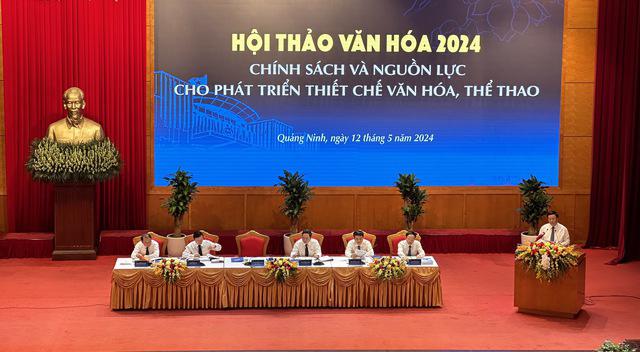A national seminar convened in Quang Ninh province on May 12 cast a spotlight on the pressing need for comprehensive reform in Vietnam's policies and funding mechanisms for cultural and sports infrastructure.
The seminar, titled "Policies and Resources for the Development of Cultural and Sports Institutions," attracted nearly 300 participants, including high-ranking government officials, esteemed academics, and influential industry leaders.
Progress and Challenges
Discussions at the seminar illuminated the significant strides Vietnam has taken in advancing its cultural and sports infrastructure since the Doi Moi reforms were initiated nearly four decades ago.
However, numerous challenges remain deeply entrenched, encompassing inadequate funding, inefficient management practices, and the persistence of outdated facilities.
Politburo memeber Nguyen Xuan Thang, Director of the Ho Chi Minh National Academy of Politics, candidly addressed the issue of funding, stating, "Funding for cultural and sports infrastructure remains insufficient, often disbursed in a piecemeal manner, hindering comprehensive development."
He noted that while modern facilities have been constructed in certain areas, many others languish underutilized or even abandoned due to a confluence of poor management and insufficient financial backing.
"There are theaters, sports training grounds, and stadiums that have been invested in quite modernly but due to inefficient operation, they have quickly deteriorated and almost had to close," Thang lamented.
"Operating costs for cultural and sports institutions are generally very limited, and many facilities only have enough to operate precariously," he added.
Calls for Comprehensive Reform
The seminar's attendees passionately emphasized the imperative for sweeping reform across the legal framework, policy landscape, and funding mechanisms to effectively address these persistent obstacles.
They advocated for the development of clearer guidelines on policy implementation, fostering greater coordination between diverse government agencies and stakeholders.
Thang underscored the need for clarity, stating, "The Party's policy on paying attention to investing in the development of cultural and sports institutions is clear. However, when it comes to implementation, many localities and units still do not know where to start and how to do it."
A Vision for the Future
A recurring theme throughout the seminar was the significance of formulating a comprehensive national plan for cultural and sports infrastructure that considers the distinct needs of various regions and communities.
Participants fervently called for heightened investment in human resources, encompassing comprehensive training and professional development initiatives for staff members within cultural and sports institutions.
Thang emphasized this point, saying, "There is a need to improve the apparatus, human resources, and training of human resources. Salaries and remuneration for the staff working at cultural and sports institutions are not satisfactory."
As the seminar concluded, a resounding call echoed for enhanced collaboration between the government, the private sector, and civil society to ensure that Vietnam's cultural and sports infrastructure can adequately cater to the requirements of its burgeoning populace.
This collaborative spirit, it was suggested, would pave the way for the creation of a more vibrant and sustainable cultural and sporting landscape within Vietnam.
Additional Recommendations
Beyond the aforementioned recommendations, participants put forth a range of additional suggestions to bolster the reform efforts. These included the streamlining of administrative procedures to simplify the process of obtaining permits and licenses for cultural and sports activities.
Additionally, the seminar explored the potential of incentivizing private investment in cultural and sports infrastructure, as well as the promotion of cultural and sports tourism to showcase Vietnam's rich heritage.
The seminar undoubtedly marks a pivotal step forward in confronting the multifaceted challenges that have long beset Vietnam's cultural and sports infrastructure.
The insightful recommendations offered by the participants provide policymakers with a well-defined roadmap to forge a more dynamic, inclusive, and enduring cultural and sporting environment across the nation.
The implementation of these recommendations promises to usher in a new era of enriched cultural experiences and expanded sporting opportunities for all Vietnamese citizens.









 Google translate
Google translate